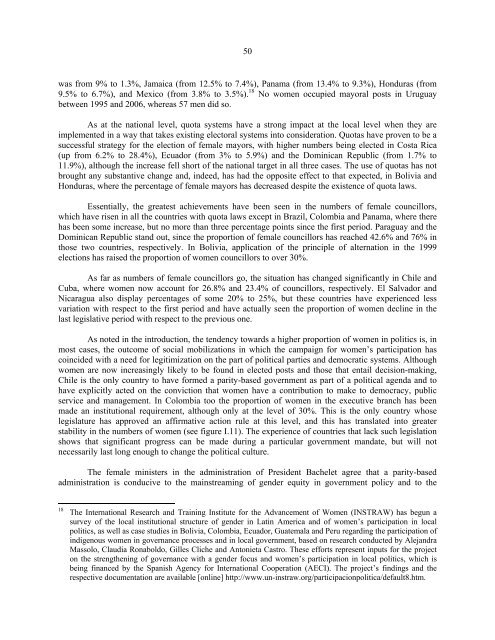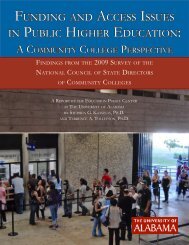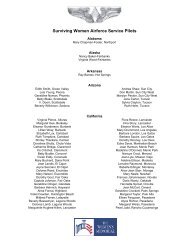Women in Latin America and the Caribbean - Cepal
Women in Latin America and the Caribbean - Cepal
Women in Latin America and the Caribbean - Cepal
Create successful ePaper yourself
Turn your PDF publications into a flip-book with our unique Google optimized e-Paper software.
50<br />
was from 9% to 1.3%, Jamaica (from 12.5% to 7.4%), Panama (from 13.4% to 9.3%), Honduras (from<br />
9.5% to 6.7%), <strong>and</strong> Mexico (from 3.8% to 3.5%). 18 No women occupied mayoral posts <strong>in</strong> Uruguay<br />
between 1995 <strong>and</strong> 2006, whereas 57 men did so.<br />
As at <strong>the</strong> national level, quota systems have a strong impact at <strong>the</strong> local level when <strong>the</strong>y are<br />
implemented <strong>in</strong> a way that takes exist<strong>in</strong>g electoral systems <strong>in</strong>to consideration. Quotas have proven to be a<br />
successful strategy for <strong>the</strong> election of female mayors, with higher numbers be<strong>in</strong>g elected <strong>in</strong> Costa Rica<br />
(up from 6.2% to 28.4%), Ecuador (from 3% to 5.9%) <strong>and</strong> <strong>the</strong> Dom<strong>in</strong>ican Republic (from 1.7% to<br />
11.9%), although <strong>the</strong> <strong>in</strong>crease fell short of <strong>the</strong> national target <strong>in</strong> all three cases. The use of quotas has not<br />
brought any substantive change <strong>and</strong>, <strong>in</strong>deed, has had <strong>the</strong> opposite effect to that expected, <strong>in</strong> Bolivia <strong>and</strong><br />
Honduras, where <strong>the</strong> percentage of female mayors has decreased despite <strong>the</strong> existence of quota laws.<br />
Essentially, <strong>the</strong> greatest achievements have been seen <strong>in</strong> <strong>the</strong> numbers of female councillors,<br />
which have risen <strong>in</strong> all <strong>the</strong> countries with quota laws except <strong>in</strong> Brazil, Colombia <strong>and</strong> Panama, where <strong>the</strong>re<br />
has been some <strong>in</strong>crease, but no more than three percentage po<strong>in</strong>ts s<strong>in</strong>ce <strong>the</strong> first period. Paraguay <strong>and</strong> <strong>the</strong><br />
Dom<strong>in</strong>ican Republic st<strong>and</strong> out, s<strong>in</strong>ce <strong>the</strong> proportion of female councillors has reached 42.6% <strong>and</strong> 76% <strong>in</strong><br />
those two countries, respectively. In Bolivia, application of <strong>the</strong> pr<strong>in</strong>ciple of alternation <strong>in</strong> <strong>the</strong> 1999<br />
elections has raised <strong>the</strong> proportion of women councillors to over 30%.<br />
As far as numbers of female councillors go, <strong>the</strong> situation has changed significantly <strong>in</strong> Chile <strong>and</strong><br />
Cuba, where women now account for 26.8% <strong>and</strong> 23.4% of councillors, respectively. El Salvador <strong>and</strong><br />
Nicaragua also display percentages of some 20% to 25%, but <strong>the</strong>se countries have experienced less<br />
variation with respect to <strong>the</strong> first period <strong>and</strong> have actually seen <strong>the</strong> proportion of women decl<strong>in</strong>e <strong>in</strong> <strong>the</strong><br />
last legislative period with respect to <strong>the</strong> previous one.<br />
As noted <strong>in</strong> <strong>the</strong> <strong>in</strong>troduction, <strong>the</strong> tendency towards a higher proportion of women <strong>in</strong> politics is, <strong>in</strong><br />
most cases, <strong>the</strong> outcome of social mobilizations <strong>in</strong> which <strong>the</strong> campaign for women’s participation has<br />
co<strong>in</strong>cided with a need for legitimization on <strong>the</strong> part of political parties <strong>and</strong> democratic systems. Although<br />
women are now <strong>in</strong>creas<strong>in</strong>gly likely to be found <strong>in</strong> elected posts <strong>and</strong> those that entail decision-mak<strong>in</strong>g,<br />
Chile is <strong>the</strong> only country to have formed a parity-based government as part of a political agenda <strong>and</strong> to<br />
have explicitly acted on <strong>the</strong> conviction that women have a contribution to make to democracy, public<br />
service <strong>and</strong> management. In Colombia too <strong>the</strong> proportion of women <strong>in</strong> <strong>the</strong> executive branch has been<br />
made an <strong>in</strong>stitutional requirement, although only at <strong>the</strong> level of 30%. This is <strong>the</strong> only country whose<br />
legislature has approved an affirmative action rule at this level, <strong>and</strong> this has translated <strong>in</strong>to greater<br />
stability <strong>in</strong> <strong>the</strong> numbers of women (see figure I.11). The experience of countries that lack such legislation<br />
shows that significant progress can be made dur<strong>in</strong>g a particular government m<strong>and</strong>ate, but will not<br />
necessarily last long enough to change <strong>the</strong> political culture.<br />
The female m<strong>in</strong>isters <strong>in</strong> <strong>the</strong> adm<strong>in</strong>istration of President Bachelet agree that a parity-based<br />
adm<strong>in</strong>istration is conducive to <strong>the</strong> ma<strong>in</strong>stream<strong>in</strong>g of gender equity <strong>in</strong> government policy <strong>and</strong> to <strong>the</strong><br />
18<br />
The International Research <strong>and</strong> Tra<strong>in</strong><strong>in</strong>g Institute for <strong>the</strong> Advancement of <strong>Women</strong> (INSTRAW) has begun a<br />
survey of <strong>the</strong> local <strong>in</strong>stitutional structure of gender <strong>in</strong> Lat<strong>in</strong> <strong>America</strong> <strong>and</strong> of women’s participation <strong>in</strong> local<br />
politics, as well as case studies <strong>in</strong> Bolivia, Colombia, Ecuador, Guatemala <strong>and</strong> Peru regard<strong>in</strong>g <strong>the</strong> participation of<br />
<strong>in</strong>digenous women <strong>in</strong> governance processes <strong>and</strong> <strong>in</strong> local government, based on research conducted by Alej<strong>and</strong>ra<br />
Massolo, Claudia Ronaboldo, Gilles Cliche <strong>and</strong> Antonieta Castro. These efforts represent <strong>in</strong>puts for <strong>the</strong> project<br />
on <strong>the</strong> streng<strong>the</strong>n<strong>in</strong>g of governance with a gender focus <strong>and</strong> women’s participation <strong>in</strong> local politics, which is<br />
be<strong>in</strong>g f<strong>in</strong>anced by <strong>the</strong> Spanish Agency for International Cooperation (AECI). The project’s f<strong>in</strong>d<strong>in</strong>gs <strong>and</strong> <strong>the</strong><br />
respective documentation are available [onl<strong>in</strong>e] http://www.un-<strong>in</strong>straw.org/participacionpolitica/default8.htm.











